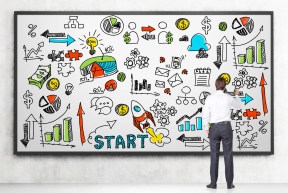The other Silicon Valleys
Israel, Russia, Saudi Arabia, Sweden or England: where will the next innovation hub be?
Now, it’s not just Santa Clara Valley. At some point, the Silicon Valley – the ultimate technology incubator – will have lost out. Or, at least, share its primacy. But with whom?
The new Digital Economy & Society Index (DESI), published by the European Commission on Feb. 26, shows that digitalization is now a global phenomenon. And innovation grows with it.
Sure, there are more advanced areas. Overall, the EU received a score of 0.52 out of 1 and all Countries improved their scores, excepting Sweden which anyway confirmed its position among the winners.
According to these data, it’s reasonable to expect that the most digitized and dynamic centers will run to become the next capital of innovation. Currently - inside and outside Europe - there are some candidates who are pressing to impose themselves. And we can call them “the new Silicon Valleys”.

Tel Aviv
It’s mostly the northeastern neighborhood of Ramat HaHayal, where some of the leading global high-tech firms have research and development offices. The American and European start-ups are the product of genius and private initiative, while in Israel they are a collective enterprise that defines the economy of a nation. As the kibbutz in the ‘50s.
Today, in fact, Israel dedicates to research and development more than 4.4% of its GDP (the highest score in the OECD countries), and the Ministry of Economy spends around $ 450 million for new start-ups. This public investment, combined with the initiative of multinational and private companies, makes a country of just 7.8 million inhabitants - and with serious geopolitical problems - an innovative center where every year more than 500 start-ups are founded. It ranked fifth in the last Global Startup Ecosystem Report, the world ranking of the best ecosystems for start-ups.

Skolkovo
In the Soviet era, Russian science and technology were lavished with money and resources. The Cold War played a key role in maintaining a competitive and innovative spirit, but in post-communism this spirit has virtually dried up. Now the hope of reversing Russia’s fortune is represented by a small town near Moscow: Skolkovo.
“We have money but don’t have our Silicon Valley,” said in 2010 the former president Dmitry Medvedev. So Russia has built from scratch the Skolkovo Innovation Center. The whole site is supposed to be completed by 2020, but the area is already working and enlarging upon five core areas: information technology, nuclear technology, energy efficiency, biomedical innovation, and space and telecommunications. Skolkovo remains the largest test ground for Russian new economic policy, although it has fallen in the Global Startup Ecosystem Report to the thirteenth place.

Kaec
KAEC is an acronym pronounced “cake”. It stands for King Abdullah Economic City, the new megacity built in the Saudi Arabian desert, north of Jeddah. A city with “2 million residents and a modern lifestyle, such as the new generation of Saudis used to while studying abroad”, explains Fahd Al-Rasheed, the managing director of the publicly traded Saudi company that runs the entire KAEC project.
Taking advantage of the proximity to the Red Sea, the city is also building “one of the largest ports in the world”. The city is divided into six main components: Industrial Zone, Sea Port, Residential Areas, Sea Resort, Educational Zone, and a Central Business District, which includes the Financial Island.

Stockholm
Under the disguise of a slow Nordic city, there is one of the most important tech start-up hubs in Europe. Just consider that both Skype and Spotify were founded in Stockholm. And there are many other recent examples, such as the Klarna Group, founded in 2005.
According to Reuters, in 2014 the Klarna generated revenues of more than $319 million. It serves 35 million users, works with 50,000 merchants and handles more than 250,000 transactions per day. This and other interesting realities - as Truecaller and Lifesum - make the Swedish city one of the most interesting and vital technology hubs in Europe. The reason for this success, according to Sebastian Siemiatkowski - CEO and cofounder of Klarna - is the famous Swedish welfare system, which allows entrepreneurs to take risks with a little more confidence.

London
East London Tech City (also known as Tech City or Silicon Roundabout) is a technology cluster located in central and east London, where it’s based, among others, the company King.com (who developed Candy Crush, for instance). Until ten years ago abandoned stores, closed factories and old industrial buildings marked the area. It slowly reborn, and now high-tech companies - whose number, in the last four years, is practically quadrupled – and now dominate the area.
With estimates ranging from 3200 to 5400 tech start-ups active and a yield of more than $44 billion, London is the innovative capital of the old continent also because it is close to the financial center of Europe and has a special link with the United States. Not to mention the fact that the British government, with programs like the SEIS, offers tax reliefs to investors taking high-risk in newly founded companies.
But the competition is still open. And while the Silicon Valley remains strong at the top of the best start-ups ecosystems in the world, there is no answer to the million-dollar question: what is going to be the next innovation hub?
